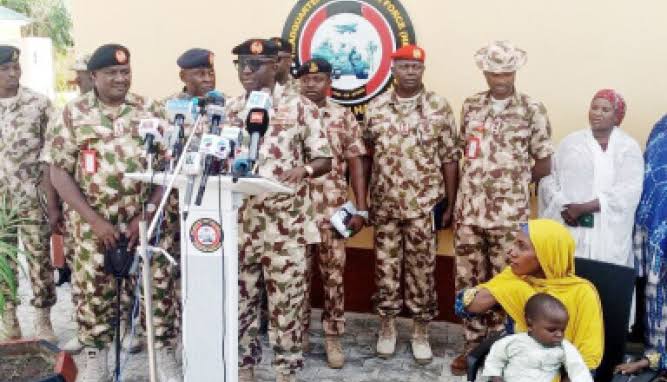News
Rescued Chibok girl narrates ordeal in Boko Haram den: Married 8 times, pregnant again

Eyi Abdul, one of the young women abducted from the Chibok Girls’ school in April 2014, has regained her freedom after nearly ten years in Boko Haram captivity.
Her account offers a harrowing glimpse into the experiences of the hostages, particularly the use of forced marriage as a tool of control by the insurgents.
At a presentation at Maimalari Cantonment in Maiduguri on Tuesday, the Theatre Commander of Operation Hadin Kai, Maj-Gen. Waheed Shuaibu, said Ehi, who is three months pregnant, was rescued on June 23, 2024, along with her two children in Sambisa Forest.
Briefing journalists at the headquarters of Operation Hadin Kai Theater Command, at Maimalari barracks Maiduguri on Tuesday, Ehi, now 27, stated that she was compelled to marry eight different Boko Haram fighters during her ordeal. She is currently three months pregnant and has two young children, all fathered by her captors.
Read Also: Ex-commissioner denies hand in attack on dep gov Shaibu, Okpebholo’s convoy
She said, “I trekked for days before getting to a military checkpoint in Nigeria where they took me and my children in.
“I married eight men and gave birth to three children for different husbands. I did not escape all the while because I did not want to escape earlier until now.
“We the Chibok girls are not kept in the same camp, and I don’t know why they are still in captivity but those of us have chosen to remain in Sambisa, while others have not had the chance to escape.”
Her release comes alongside 332 others, including 110 women and 220 children, rescued from the Bama-Pulka axis of the Sambisa Forest during a recent operation by the Joint Task Force, Operation Hadin Kai.
However, her comments suggest a more complex situation regarding the remaining hostages.
She claims the Chibok girls were not held together and implies a potential element of choice in her delayed escape.
The Borno State government has assumed responsibility for the rehabilitation of Abdul and the other rescued individuals. However, her future remains uncertain. Abdul expressed doubt about resuming her education, highlighting the long-term psychological and social impact of her captivity.
Eyi Abdul’s story serves as a potent reminder of the ongoing trauma endured by the Chibok girls and the challenges they face in reintegrating into society. It also underscores the need for continued efforts to secure the release of those still held captive.
Join the conversation
Support Ripples Nigeria, hold up solutions journalism
Balanced, fearless journalism driven by data comes at huge financial costs.
As a media platform, we hold leadership accountable and will not trade the right to press freedom and free speech for a piece of cake.
If you like what we do, and are ready to uphold solutions journalism, kindly donate to the Ripples Nigeria cause.
Your support would help to ensure that citizens and institutions continue to have free access to credible and reliable information for societal development.


























